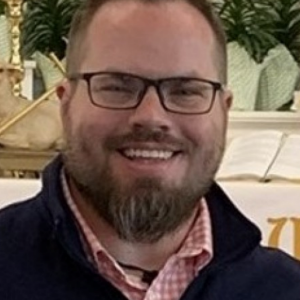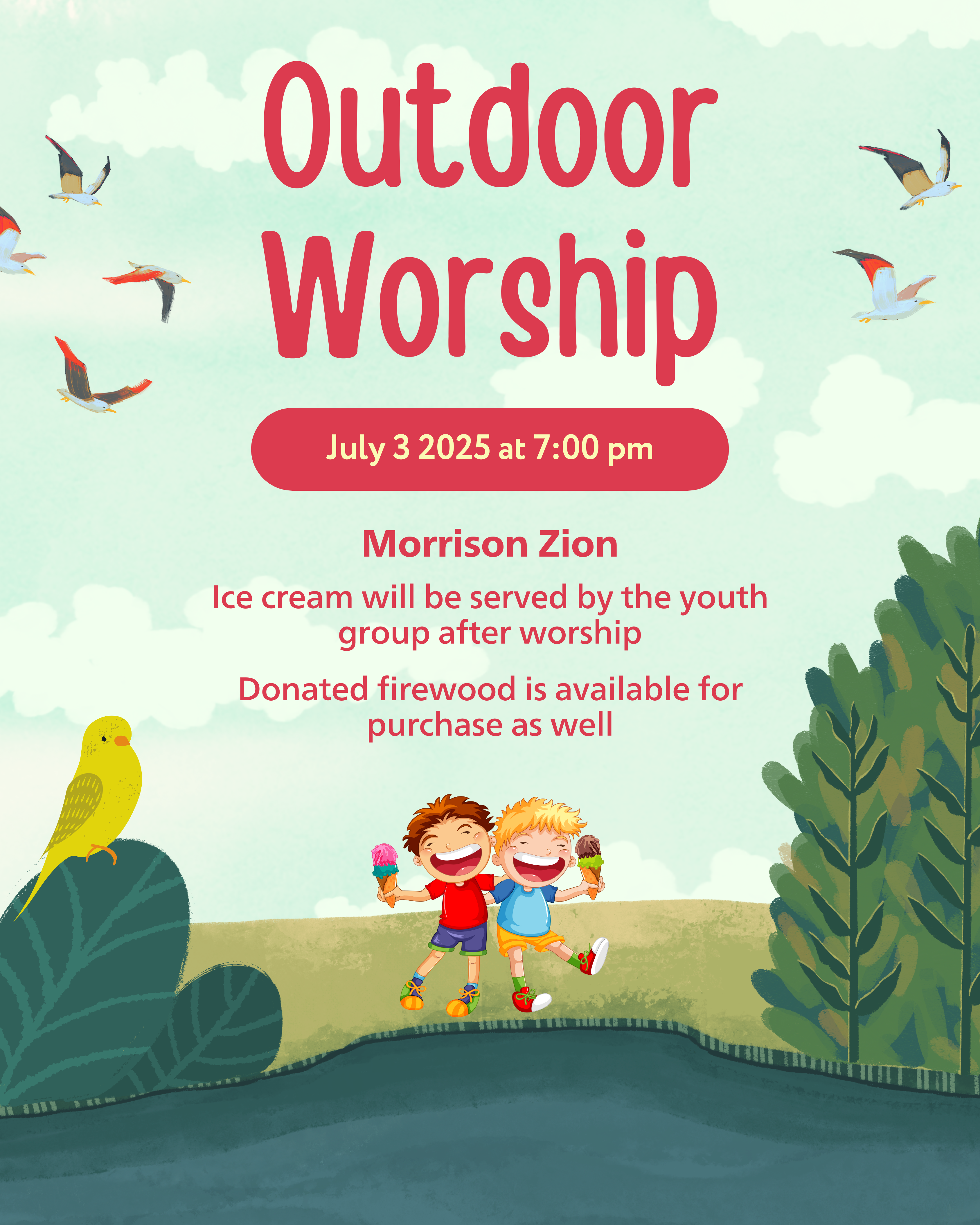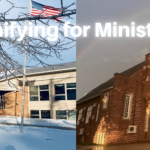The King Shall Come: He is Coming to Save Us
The Verdict Is In
The world is ________ and _________
The King will bring _________
How can we be _______?
We too are _________
We _______ the Lord for His ______
We _____ the Lord to ______ in ____
Welcome to worship today at Morrison Zion Lutheran Church. We exist to glorify God. We have set out to do this by gathering around the Gospel so that we may grow in the Gospel and go to others with this Gospel.
Grace and peace to you from God our Father and from Jesus Christ, our Lord:
In our current age, there have been some pretty popular or famous trial cases. The most famous I remember when I was growing up was the white Bronco. I think Ford pretty much got rid of the Ford Bronco for probably a generation or two because of O.J. Simpson running down the highway with that white Bronco and the police cars chasing him. The nation was captivated by that courtroom scene with all the different attorneys on one side and the attorneys on the other and seeing the court. I think that was the first real publicized video court case in American history.
Since then, in years recent we’ve had a lot more; the George Floyd trial that recently took place, the Kyle Rittenhouse trial, Jussie Smollett was not that long ago and then recently there was the Alex Murdaugh trial. If you watch the court cases on evening news, they continue to have more and more stories about the Murdaugh family. You can watch these trials and see all the different things put out there.
One of the most fascinating times of those trials was after all of the evidence was laid out and the defense had put out their defense, the prosecution had laid out their case, the closing arguments were made, and then everything was put to the jury. Sometimes it was a couple days or maybe just a few hours, but then to go back into the courtroom and to see the waiting, the worry, the anticipation, the doubt, and the struggle to see what the verdict was going to be. I don’t think many of us have had cases where we’ve been in a courtroom where we are sitting there waiting for an important verdict to come in, so for us to see that, it’s quite astounding as the people in the courtroom and many other people are waiting for that verdict to come in and to see the reactions. Maybe you’ve been in a courtroom and experienced that. Once that verdict is in, there is either great excitement or great sorrow.
As we look at what God is telling us today, He tells us that the verdict is in. The verdict is in for us and the world but what does that mean for everyone and for our future?
When Isaiah is writing this, this section is quite amazing because it’s really a prayer. As Isaiah is crying out, you can really put yourself in his place in many ways, so this is a great section for us to look at and for us to put ourselves in the place of Isaiah. Is our world the same even though Isaiah was written thousands of years ago, 700 years before Christ? That’s over 2,500 years ago. Are we feeling the same things? Are the same things that God says to them applicable to us today? I would say yes.
So what was the situation for Isaiah? Isaiah says, “Oh, that you would rend the heavens and come down, that the mountains would tremble before you!” What is he saying? What is he expressing there? He is expressing a frustration and a desire, “Jesus, could you just come? God, could you just come back?” He is expressing that the world is broken and waiting. We are trembling and waiting for God to return because there is something wrong. In all that we face, we know that there are problems. If you watch those court cases, does justice always come? In your situations, when you are trying to be reconciled or find peace and have the justice system work in your favor, does it always work? Justice isn’t always found in this world. We know that this world is broken, and for Isaiah and his people, their world was certainly broken.
When Isaiah is writing, the Northern Kingdom had been taken over by Assyria. Isaiah speaks about how Babylon will come and take over Jerusalem and the Southern Kingdom. These things are going to happen and the people cry out and say “Things are hard!” So we see our life is hard and we say “God, come help us!” Do you ever feel that way? “God, life is hard! Can you just make it a little bit easier? Could you just come and fix things for us?”
As he writes, he talks about what God will do when He will come. He’ll come down, the mountains will tremble before Him, but then he says this: “As when fire sets twigs ablaze and causes water to boil, come down to make your name known to your enemies and cause the nations to quake before you! For when you did awesome things that we did not expect, you came down, and the mountains trembled before you. Since ancient times no one has heard, no ear has perceived, no eye has seen any God besides you, who acts on behalf of those who wait for him.” We know that our God is going to come, and what is He going to do? He will bring justice. It speaks about the fire kindling and the water boiling, this truth of what God will bring is coming and no one can hold it back. What is He bringing? We know the King will come and He will bring justice. He speaks of how God will act on our behalf and that no eye has seen and no ear has perceived what God will do, what He can do. We hope and pray that He will do what is right and just, and we know He will. We stand before God and we can’t even imagine what it will look like.
Imagine what a world without pain, without suffering, without injustice would be like. Can you even imagine it? Even our greatest days, even the best days are still filled with difficulty and pain and sadness. So we know our Lord will come. The King will come and bring justice, He will bring peace, and He will bring restoration, all of these great, amazing things. So as we cry out and we call for justice, we call for God to come (that’s what Isaiah was doing), saying “God, come, fix the problems! Bring that justice.”
But notice what happens next, as he is talking about justice. In Verse 5 he says: “You come to the help of those who gladly do right, who remember your ways.” (You’re coming to help us, right?) But then look at the next words: “But when we continued to sin against them, you were angry. How then can we be saved?” Isaiah knew the truth. We cry out and we say “God, come fix the problems. Come and change those people.” Or “All the problems out there, God, come fix that.” Isaiah says, “As much as we cry out about all those things, we’re forgetting something. We’re forgetting about us.” So he says, “How can we be saved?” How can we be saved? There are the struggles of understanding that we have fallen short, too. We like to point the finger. We like to look at others but the reality is that we have to see that we have fallen short. Isaiah knew this from the time he was called. Isaiah was called by God and God tells him to go out and he says, “I can’t go out. I’m a man of unclean lips among a people of unclean lips. I don’t deserve this. I can’t do it.” So we need to see why we need to be saved.
In Verse 6 he says, “All of us have become like one who is unclean, and all our righteous acts are like filthy rags; we all shrivel up like a leaf, and like the wind our sins sweep us away.” The truth is that we too are unclean. As much as we try to talk about our righteous acts and how good we are because we made it here on a Sunday morning when there is lots of snow (that’s great), but we can put that feather in our cap and we can look down on the others who aren’t here. But we know that all of our righteous acts (what does Isaiah say?) are like filthy rags. We are unclean.
When he talks about how our righteous acts are like filthy rags, what he is talking about are like bloody rags, not just some dirt, but something kind of reprehensible. What he is really talking about is that time of the month for women; that type of rag. He is saying that’s what we are. Our righteous acts, the greatest thing that we can point to in God’s eyes, they are filth, because we fall short. Even if we try to do something selflessly, we point back to ourselves and say “God, why don’t people thank me enough?” Or we try to compare ourselves to others and say “I’m doing enough.” It’s almost impossible to go through life, even as Christians, without comparing ourselves. We compare ourselves to people not in the church but then we compare ourselves to everyone in the church. It’s so easy to do. But Christianity is so great because it takes us all down to the same level and says “No one is greater than the other.” All of our righteous acts don’t earn us anything. We fall short.
While we fall short, we know that’s not the end because we are calling on our God, our King, to come to save us; to take those filthy acts, those filthy rags, and change them. When Isaiah cries out, he says, “Yet you, Lord, are our Father. We are the clay, you are the potter; we are all the work of your hand. Do not be angry beyond measure, Lord; do not remember our sins forever. Oh, look on us, we pray, for we are all your people.” Isaiah cries out to God and says “Remember our sins no more. We know that you know us inside and out.” In the verses before, it says, “No one calls on your name or strives to lay hold of you…” Even as Christians we know that we fall short and we need God to forgive us. We need that King to come down, that King to come down from heaven, and to ride in on a donkey; for that King to come down and to be humble, to ride in our place. He knew all things (as the Gospel Lesson showed) and what did He do? Even though He knew He would die for us, He would suffer for us, He still came. He lived a perfect life for you so that you could be saved. We thank the Lord for His work in saving us, that the King has come and forgiven our sins.
When Isaiah was called, he spoke and said “I am a man of unclean lips, among a people of unclean lips.” God took a coal and touched his lips and said “You are forgiven.” As God comes to us in man, as Jesus comes, as He stretches out His arms, we know that He says our sins have been separated from us. They are as far as the east is from the west. God doesn’t remember our sins anymore. Though we struggle to hold onto our guilt and to forgive others, God says “I forgive you. Those filthy rags have become white as the snow outside.”
So we who are unrighteous stand before God, who is righteous, not because of the things we’ve done but because of faith in Christ, faith in someone who can save. If we were striving and striving and striving, we would fall short over and over again, but we can rest secure in our Savior, the One who has done everything in our place perfectly. So we cling to our King. We cling to the work that the Lord has done for us. We thank Him for that work.
But then notice what else Isaiah says. He says there, “We are the clay, you are the potter; we are all the work of your hand.” What does it mean that we are the work of His hand? Over and over again we fall short and God reshapes us. He forgives us. He cleans the slate over and over again. But also, we know that we can thank God for all He has done, and we ask the Lord to work in us, to give Him thanks, to be that clay, to work for Him, and so we know that we are God’s workmanship, created to do good works.
It’s easy to wonder and struggle and say “If I’m forgiven, if I don’t need to work, then I don’t need to do good works. What does it matter?” He says that we are created to do good works. God uses us to love others and to serve others; to serve Him and to serve others. We ask how we can do this. How can we be those who work in God’s service?
In 1 Corinthians (the Second Lesson), Paul says that you have been given all of the spiritual gifts you need. You don’t lack any spiritual gifts. Is he talking to you, the one person, personally? What do you think he is doing? He is talking to us. If you’re from Texas, it’s “ya’ll.” He is saying that you all do not lack any spiritual gifts. So we need to work together and understand that God has given each of us different gifts and abilities and talents to work together in service to God; in service to God in your homes, at work and in the church.
We would love to enable us, as a church, to do that more and more in Zion. In the back of church, there are some surveys that were handed out, and devotion books. They were sent out, I think at the end of August, and then in emails the last couple of months. In the devotion book, it talks about serving the Lord; encouragement that you don’t just serve God here. You get to serve God everywhere. Service to God should never be forced. It’s out of thanks, as we said, for what God has done for us. In there is a little survey to talk about what gifts you have and what area you are interested in serving. There are about 20 back there. If they all get taken today, we’ll put more out there. We’d love to know a little bit more about you and how you would like to serve.
Also back there are two other things. There is one that talks about a spiritual gift analysis. If you aren’t quite sure of your spiritual gifts and how you can serve, you can fill that out. You can even do it online. Then there is another, bigger Roles, Tasks and Mission Opportunities that talks about all sorts of ways that you can serve both at Zion Church and the School. Some of those are things that we’re doing now. Some things that we hope to do. But we see that as we know what God has done for us, we want to show that in love, not because those acts are earning us anything but those works are good in God’s eyes because we have faith and we know that is what God has created us to do. He is the potter. We are that clay. So we ask God to mold us. Help us to work together but (as Paul says) that we don’t lack any spiritual gifts.
The truth is that I do lack spiritual gifts. I, on my own, do but we, all together, do not. We know together we can serve our Lord so we can know what Christ has done for us and do it out of love. But none of this gets us the verdict. The verdict is in. The King is coming to bring justice and our sins are forgiven. God has loved us and redeemed us.
In a book we read on Sunday nights not too long ago it said Christianity is so unique because our works, our service, our performance does not get us the verdict that we are forgiven and have peace with God. The verdict comes first. You are forgiven. You are loved. And that encourages and motivates us to love and serve God and to serve others. So know the verdict is in and that King is coming. He will give us justice and He will bring us peace and forgiveness. Amen.
And the peace of God, which transcends all understanding, will guard your hearts and your minds in Christ Jesus. (Philippians 4:7) Amen.




